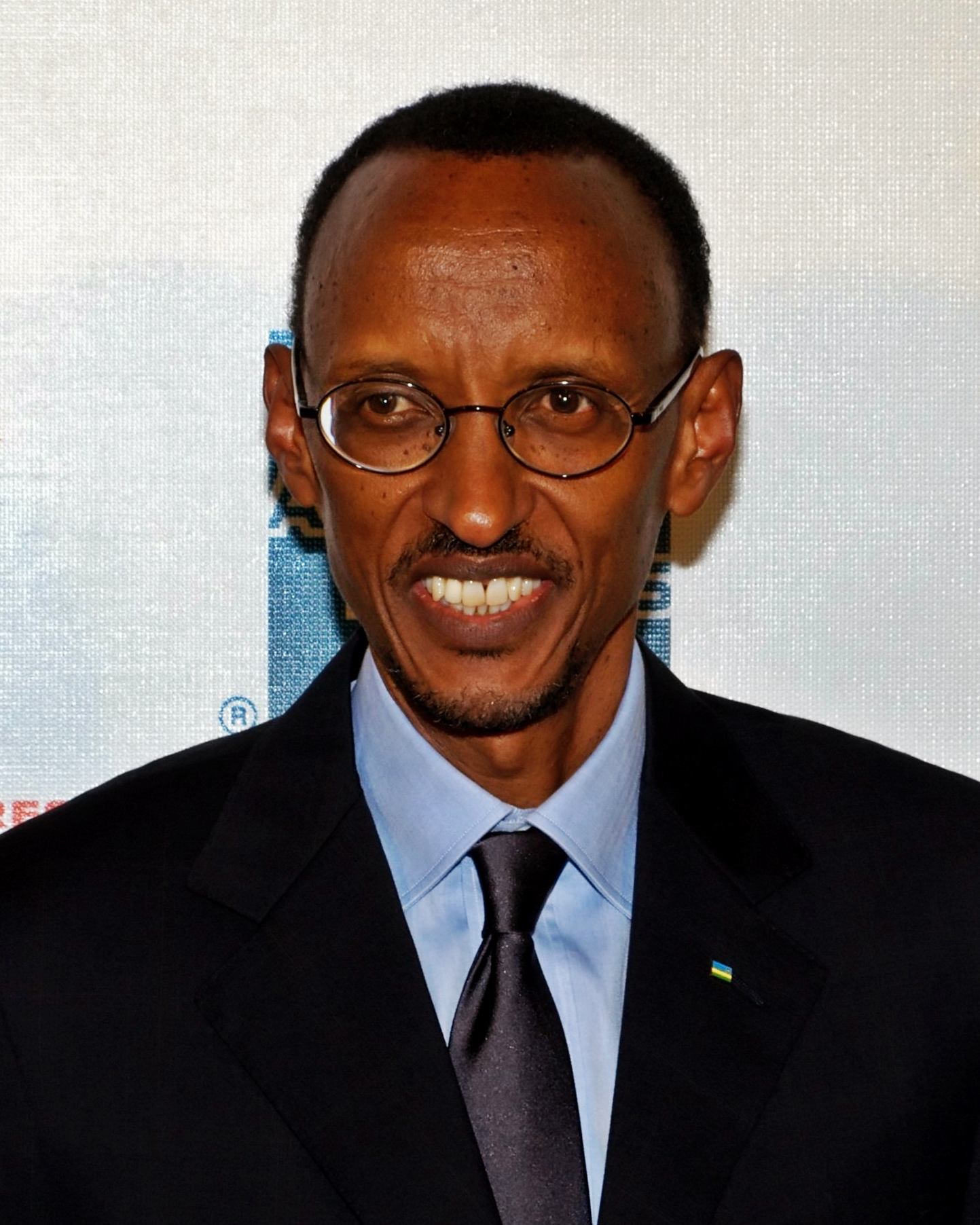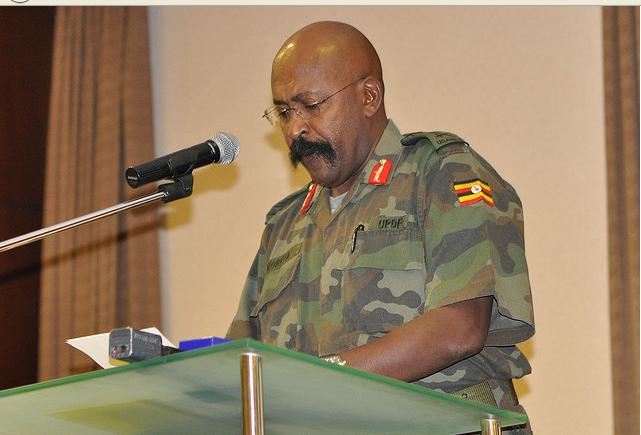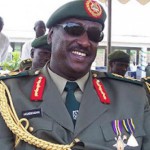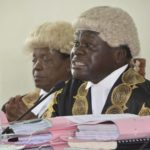Paul Rutagambwa Kagame
Like President Yoweri Museveni, Paul Rutagambwa Kagame also needs little introduction; is the President of Rwanda. And like Museveni, Kagame also went to Ntare School. He was one of the ‘Original 27’ fighters who attacked Kabamba on February 6, 1981. On capturing power in 1986, then Senior Officer Kagame became the Deputy Director of Military Intelligence, serving under the SO Mugisha Muntu. In 1990, after the death of Major General Fred Gisa Rwigyema, then Major Kagame returned from a military course at the Command and General Staff College, Fort Leavenworth in the US to take command of the Rwanda Patriotic Front/Army (RPF/A), a military-politico organization formed by Rwandan refugees in Uganda.
In 1994 the RPF/A took power in Rwanda, then Major General Kagame became Vice President and Minister for Defence, positions he held till 2000, when he was made President and Commander-in-Chief after the ouster of Pasteur Bizimungu, the first post-1994 president.
Kagame was first elected president by adult suffrage in 2003 and currently, Kagame is serving his second seven-year term as President and it is likely the Parliament will amend the Constitution to allow him serve further.
Familiy: Born to Deogratias and Asteria Rutagambwa in Gitarama, Rwanda in 1957, 58-year old Kagame is married to Jeanette Nyiramongi Kagame and together they have four children.
Lieutenant General Ivan Koreta
An officer and gentleman, Ivan Koreta is one of the most distinguished soldiers of the National Resistance Army (NRA) and its successor the Uganda People Defence Forces (UPDF).
Born in 1964, Koreta joined the Front for National Salvation (Fronasa) as a teenager and participated in the overthrow of Aimn in 1979. By the time the NRA captured Kampala Koreta was a Senior Officer and, in 1987 while awarding ranks he was made Lieutenant Colonel. A highly disciplined officer, Koreta served in various command and administrative roles, becoming the first-ever Ugandan army officer to lead a UN peacekeeping mission, when he led troops to Liberia in the 1990s. He has also served as the Director General of the Internal Security Organisation (ISO) between 1998 and 2001; Commandant of the Senior Staff College at Kimaka in 2004; Chairman of the General Court Martial (C/GCM) in 2006 and Deputy Chief of Defence Forces (D/CDF) between 2005 and 2013. He is currently Ambassador-designate.
Major General James Kazini Bunanukye
Major General James Kazini Bunanukye was born in 1957, and reportedly joined the army during Idi Amin’s regime in the late 1970s. After the 1979 war, he reportedly joined the Uganda National Rescue Front (UNRF), a rebel group headed by General Moses Ali, the current Third Deputy Prime Minister.
In 1984, Kazini left the UNRF and joined the National Resistance Army (NRA), where he started off as a ‘foot soldier’. He however, rose through the ranks and by 1987 was commissioned Captain. Two years later he was promoted to Major and posted to the Military Police in Makindye as Commander. Again, after another two years Kazini was promoted to Lieutenant Colonel and posted to Masaka Mechanised Regiment as Commander.
In 1996 Kazini was promoted to Colonel and posted to the Division 4 in Gulu as Commander, and in 1998 he was deployed to Kasese to oversee the operations against the Allied Democratic Forces (ADF) rebels.
In 1999 Kazini was promoted to Brigadier and was appointed Chief of Staff of the UPDF. He was also named Commander of Operation Safe Haven in the Democratic Republic of Congo and in 2000 Kazini was recalled from the Congo. In 2001, he was promoted to Major General and appointed Army Commander, serving in that post till 2003, when he was fired. Later that year he was committed to the General Court Martial to face charges of ‘creation of ghost soldiers’ and in 2008 the GCM under Lieutenant General Ivan Koreta sentenced him to three years in jail for causing a financial loss of Shs60 million.
After that he went into oblivion only for news to filter in on the morning of November 10 2009 that he had been killed at the home of his girlfriend Lydia Draru, who lived in the Kampala suburb of Namuwongo. At the time of his death James Kazini was 52 years old.
Lieutenant General Henry Tumukunde (RO111)
Born in 1955, Henry Tumukunde is a highly regarded military officer who joined the National Resistance Army after completing education at Makerere University, where as a student he was involved in ant-government politics. After the bush war in 1986, then JOII Tumukunde was posted to the United Kingdom as Military Attaché. He has served in various command and administrative posts in the army and Intelligence, and has at different times headed the Chieftaincy of Military Intelligence (CMI) and the Internal Security Organisation (ISO).
In 1994 Tumukunde, a lawyer, was a Constituent Assembly Delegate (CAD) representing then Rubaabo County, and later in 1996 he was named one of the 10 Members of Parliament representing the Army. In 2003 Tumukunde was later to disagree with the establishment, after he opposed the removal of term limits.
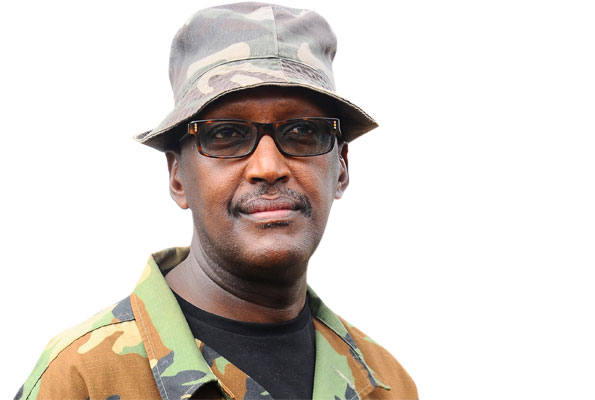
About a year later he disagreed with his bosses in the army, after he was accused of abuse of office and spreading harmful propaganda. He resigned from Parliament in May 2005 and was later arrested and incarcerated for close to two years at the Officers Mess in Kololo, an upscale suburb of Kampala City. He was released in 2007 but continued attending Court Martial hearings up to April 18, 2013, when he cleared of the charge of spreading harmful propaganda after a grueling eight-year trial. He was however, found guilty on the charge of military misconduct and was subsequently sentenced to a severe reprimand.
Recently, in a surprising move President Yoweri Museveni promoted Tumukunde to the rank of Lieutenant General and retired him from the UPDF.
Major General Joram Mugume
One of those Uganda Peoples Defence Forces (UPDF) officers who get rare mention, Major General Joram Mugume was a Senior Officer by the capture of Kampala in 1986, and was one of only three Colonels at the commissioning of ranks in 1987. He has served as Deputy Army Commander, Senior Presidential Advisor on Defence and is currently the chairman of the UPDF Land Board.
Major General Matayo Kyaligonza (RO0034)
A military officer and diplomat, Matayo Kyaligonza was probably one of the most feared officers in the then NRA, having carried out several deadly exploits during the bush war. He was a Member of the NRA High Command and on capturing power in 1986 Kyaligonza was one of the Senior Officers who later became Brigadier alongside Tadeo Kanyakole (RIP), David Sejusa aka Tinyefuza and Eriya Kategaya (RIP). On entering Kampala Kyaligonza commanded the 7th Battalion, which went on to liberate eastern Uganda.
In 1994 he was elected Constituent Assembly Delegate (CAD) for Buhaguzi County, and in 1996 he represented the same County in Parliament after he was promoted to Major General and retired from the UPDF.
Maj Gen Kyaligonza is currently Uganda’s Ambassador to Burundi and also serves as the National Resistance Movement vice chairman for western region.
Major General Robert Rusoke
An officer and diplomat, Robert Rusoke was Joint Chief of Staff of the UPDF from 2005 to 2012. In August the same year he was appointed Uganda’s Ambassador to South Sudan.
Brigadier Charles Tusiime Rutarago
Little is said and known about Brigadier Charles Tusiime Rutarago but he is one of the ‘Original 27’ fighters who attacked Kabamba Military Training School on February 6 1981. At the capture of Kampala in 1986, Rutarago was a Junior Officer 1 (JOI) and worked with the Military Intelligence. He is currently the Head of the Royal Guards, a force in charge of protecting all cultural institutions in the country.
Brigadier Kasirye Ggwanga
To many, Samuel Fog Kasirye Ggwanga may not need introduction but sources say he joined the army during Idi Amin’s regime in 1972, after completing S4. By the time of Amin’s ouster in 1979, Kasirye Ggwanga was a Staff Sergeant and he was arrested and kept in Luzira Prisons for about two and a half years. After prison he joined the Uganda Freedom Movement (UFM) under Dr Andrew Kayiira, and later abandoned UFM for the freedom Democratic Movement (FEDEMU), which was headed by the late Captain George Nkwanga. Kasirye Ggwanga joined the National resistance Army in 1985, rising through the ranks to become a Brigadier. Currently, he is a Presidential Advisor on Security in the Buganda region.






